- Home
- Nancy Means Wright
Broken Strings Page 2
Broken Strings Read online
Page 2
“I thought I’d paint them green,” Chance said. “Green goats. Green like frogs, but with hooves and hocks and maybe a human head like Pan.”
“Dionysius,” Fay said.
“Who?”
“The Greek equivalent of Pan. He played a pipe and ambushed young girls.
Altogether a naughty fellow.”
“Like Cedric Fox,” Chance said, slurping the leftover juice out of the juice bottle.
“What?”
“I saw him. Coming out of Alibi.”
“And?” Alibi was the local lounge. You could get snacks there, but the fare was mostly alcohol. College students and high school kids like seventeen-year-old Chance were checked and rechecked at the door. But Chance had said coming “out,” which meant she was outside looking in when she saw Cedric. At least Fay hoped so.
“With a woman. It was getting dark, and he was probably high. I could see them as I was leaving the craft center. I was doing prototypes for my Billy-Goat-Gruff.”
“And?”
Chance gave a sly smile. “Cedric had her by the waist. They were waltzing on down the alley past the craft center. That’s all I can tell you. And it wasn’t Marion.”
“Could’ve been a sister or something? A relative?”
“This was no relative.” Chance smirked, as though Fay simply wasn’t with it. Which was partly true; Fay hadn’t had a real date in years since she’d left the old lover and come to live in Cousin Glenna’s non-working Vermont farm.
“I’m off to the barn,” Fay said. “But if you see this woman again, know who she is, let me know, okay? Just curious, that’s all,” she said when the foster girl looked at her. She opened the door and let the wind fan her hot forehead. The mountains rose lavender-cool beyond the red barn. They’d quit mowing the grass now, the pasture was a lake of blue vetch and Queen Anne’s lace. She liked it that way. September wasn’t yet October, the leaves weren’t ready to fall. Falling leaves were depressing.
“I know who that woman is I saw,” Chance said, running past Fay to hop on her bicycle. “She’s the high school French teacher.”
“Oh my God. Young? Attractive?” Fay called after her, thinking of Marion in her coma. And her husband philandering about with another woman?
“Drop-dead-gorgeous,” said Chance, and she peeled off down Flint Road toward Billy the old Kid.
* * *
There was more than milking or cheese-making this afternoon that held Fay in thrall – already the puppeteering had put Fay’s Goats ‘R’ Us cheeses behind, and still orders were coming in like flies. But today, God forbid, she had to trim the hooves—it was on the “How to Raise Goats” list. Overgrown hooves, the vet warned, would turn under around the sides and maybe grow out in front like elf shoes. The younger Nubian goats were okay for now, their long ears flapping as they dashed about in the pasture. But Hester needed emergency hoof help.
The word “emergency” made the perspiration pop out on her temples. There had been no word from Cedric, who’d promised to call. Was he with the nubile French teacher now, or was he – and he’d better be – at Marion’s side in the hospital? For when she awoke from the coma?
“No!” It was Ariadne, butting at the pail of milk. “Get,” Fay shouted. “Get, girl!”
She corralled Hester and brought her to heel in the barn. The instructions were laid out on a stool. “Start by cleaning out the manure and curd with a hoof pick.” A sticky, stinky job at best. Hester bleated. Fay had pricked the toe. She got the doe in a grip and trimmed off the overgrown sides, down to the white sole. The beast lunged out of Fay’s grasp.
“Need help?” It was white-haired Willard Boomer, her Willard of all trades: sign maker, grass cutter, tree grower. Willard, who worked for free in return for the use of the derelict trailer where he kept his tools and model trains and sometimes slept. Willard Boomer, who was in love with Fay but didn’t know it. Or if he knew it, had no idea how to show it. After all, it was only a year ago, when he was fifty-three, that his mother had crept quietly into the grave and liberated her shy, maverick son.
He didn’t wait for an answer, just dragged the doe back into the barn and held her down while Fay took a wet toothbrush to scrub the sides of the hoof. “Good job,” he said, and she smiled. Willard smelled of new mown grass and dried paint – maybe a little manure where the goat had kicked him, but it was all right. The doe held still in his hands while Fay trimmed slices off the hard side nail to level out the hoof. It wasn’t too difficult. It was like making a meatloaf: you just followed directions and then played it by ear.
When they were done trimming he stayed to share a cup of iced tea from her thermos.
He wanted to know how Marion was. “Something she ate, you said?”
“Well, we don’t know that. Just the medic’s surmise. She and Cedric had lunch at the local Foods Co-op. I’m praying it’s just a little food poisoning and not –” She said a quick prayer to herself. “They have to analyze everything, I guess. See what else she ate besides the rabbit Cedric caught last night for dinner.”
“Drank anything between scenes?”
“Oh. Well, I don’t recall but – well yes, I saw her with the usual container of herb tea she’d buy at the Co-op. She always carries a thermos. Nothing unusual.”
“Leaves it backstage? Where someone could – ho!” The doe moved and he cornered it with a headlock.
“Backstage, I guess, yes, in a classroom. The kids aren’t supposed to enter. But, hey! out of here, Ariadne! You want your hooves clipped, do you?”
They worked a while in silence.
Then Willard said, “You heard from that guy?” Willard never called Cedric by his name – he’d had some sort of run-in with him in town, never said what it was. Though it wasn’t easy to get under Willard’s skin, so “go figure” Fay told herself. He pushed back the cloud of hair that had fallen over his eyebrows. White-haired and pink-cheeked, he could be taken for an albino except for the iris-blue eyes. Soft blue, unlike the hard iron-blue of Cedric Fox’s eyes.
“Not a word. Which could mean no change. Cedric promised to call me.”
“He usually keep his promises?”
She gave a half smile, thinking of the French teacher Chance had seen him with. Unless they had an open marriage, he was ducking some of those promises. Though she shouldn’t make a mountain out of an arm around a waist. “They could be related,” she said aloud.
“What? Who?’
She was always speaking her thoughts aloud – it came from all these hours out of a job and alone with the goats. She told Willard what Chance had seen at the Alibi, and he laughed. “Probably a cousin or something,” he said. Willard seldom thought the worst of anyone.
“Could be. My imagination, you know. Of course he’s a lot younger than Marion. The hormones and all that.”
“What difference does age make?” he said. “Marion’s a handsome woman.” Willard was blushing. Did he have a crush on Marion? Lots of men did; Fay had seen them at parties and meetings she went to off and on. She was suddenly annoyed with Willard. Why was he always hanging around here? What did he really want? It wasn’t money. He wouldn’t accept a nickel from Fay for all his grounds work.
“I have to get dinner,” she said, slapping her plastic cup down on the dirt floor. The cup tipped and the tea dregs spilled into the dirt. Willard picked up the cup. He obviously didn’t know why she was upset. His big face pinkened.
“Thanks,” she said, relenting. “I don’t know what I’d do without you, Will.”
Now he was blushing down to the silvery-pink roots of his hair. He was shaking his head, his lips trying to form words. “I’ll clean up here,” he finally said. “You go back and start supper.”
“If you’ll help eat it. And be sure Beets comes in with you? He was running your train last I saw.”
She walked slowly back through the pasture to the house. Willard’s model train was whizzing around the tracks by the flower-cum-veggy garden, where she st
ooped to pick three ripe tomatoes. She thought of Cedric, who did all the gardening because Marion didn’t have time for it. A man who gardened couldn’t be all bad, could he? If you could grow plants, could you grow a relationship?
Of course her own ex had grown fowl on his chicken farm and spewed out eggs and that relationship had soured – well, smelled was the word. Every day Fay was thankful to be out of it, though her grandson, Ethan, was now living with her, a somewhat stubborn, uncommunicative fellow. Taciturn Ethan was probably why she’d agreed to take over the foster kids.
Win a few, lose a few, she thought, the old cliché. When people asked how she was doing, she’d say, “Holding. I’m just, well, holding.”
But – oh God – Marion had let go, she learned when she entered the kitchen. Cousin Glenna met her with a glass of scotch in her arthritic hand, her lined face a waterfall. “Phone call,” she said. “Bad news. Your puppeteer friend didn’t make it. Died early this afternoon. I’m sorry, kid. Awful, awful sorry.”
The old lady reached out to gather Fay in. The glass tipped and the scotch trickled down the back of Fay’s shirt, like a puddle of sticky tears.
And Fay was drowning in it.
Chapter Three
Poisoning—and a Funeral Filled with Puppets
Sunday, September 23
“So Friday I asked for an autopsy, just for you, Fay,” the police lieutenant said, sounding annoyed – he’d caught her just as she was getting dressed for the memorial service. He made it clear that he’d written off the death as accidental. “Though I still don’t see the point. The husband’s in enough pain. Now you’re gonna tell him somebody murdered his wife?”
Fay held the receiver away from her ear. Higgins had a loud voice. She’d called him at home Sunday morning to insist on the autopsy. The doctor had given the diagnosis as food poisoning, maybe something that the rabbit had eaten, like the nightshade plant that grew wild in the woods behind Marion’s East Branbury house.
“I mean why?” Higgins was saying, hammering on his old saw. “Who’s got the motive? It’ll come out negative, you watch. Then lay off, Fay. This is Vermont. Worst ever happens around here, some college student gets drunk, leaves her door unlocked – you know the rest. Look, we’ll have a nice lunch tomorrow. Your choice of restaurant. Not the Chinese one, though.”
“It wasn’t that place at all,” Fay said. “They’re such nice people. They keep a clean kitchen.”
Monday was Higgins’s day off and he and Fay often met for lunch, she paying her own way of course. He’d suggest other possibilities afterward, but Fay always found an excuse. Today, it seemed, Cedric was his focus. Cedric was a volunteer fireman, Higgins said. The man had helped put out a garage fire that Higgins’s ex-wife had set after a row with her new boyfriend.
“Cedric just wants a nice quiet funeral for his wife,” Higgins said. “Today at four, right? I won’t be there, didn’t really know the woman, but you will, I expect. You can tell me about it at tomorrow’s lunch.”
“If I can make it tomorrow, I’ll let you know. Now I have to go. Just call me when you get the results of the autopsy.” And she hung up to look for a decent pair of shoes to wear.
* * *
The service was held in the new Unitarian Universalist sanctuary that Marion had helped fund. It was partly Cedric’s money she’d pledged, he told the minister, so he’d better do a bang-up funeral. A funeral Cedric wanted to get over with, quick, so he could get on with his life. Or on with that drop-dead French teacher, Fay thought.
A funeral that Cedric gave no money for because, according to Marion, he had no savings. After six years he’d been let go from his engineering job at General Dynamics, then run up a fifty-thousand dollar deficit on his credit card for a brand new BMW.
But the church did a nice service; the minister was an admirer of Marion, who’d taught the Religious Exploration program for kids. With Fay’s help they’d filled the sanctuary with puppets: the Sleeping Beauty characters of course; Alice and the Red Queen; the three Mikado maids; Dorothy and her Wizard; Frog, Toad and Badger. Even a grouping of monsters: dragons, werewolves, and yes, vampires. In the middle of the marionettes, they’d placed a framed portrait of Marion herself, smiling out at the mourners as if to say, “It’s all right, I know where I’m going.”
“Into the earth,” the minister said in his thoughtful eulogy. For Marion’s ashes were to be divided between the church memorial garden and Lake Dunmore where she fished and kayaked summers. “My ashes for the fishes,” she’d written into the draft of her will. Along with most of her money to Cedric, Fay figured.
“We made our wills out together,” Cedric had told Fay, who must have looked surprised. “One should always be prepared, Fay. You could cross Main Street and be knocked down by a Mobil oil truck.” Fay promised herself to make a will. Though what did she have to give? Her cousin Glenna owned the farmhouse. She’d sold the fur coat her New York boyfriend had bought her. Was it enough to will a basket of love to your estranged daughter, your off-and-on grandson, and three foster kids?
The group was getting up to sing. The songs were printed out on a church Xerox machine: this time it was from The Wizard of Oz. Somewhere over the rainbow… bluebirds sang…. The sanctuary resounded with over a hundred voices. Half the town had seemingly loved cheerful Marion, including a dozen men and women in black who had crowded into the back row. The guest book had run out of empty pages and people had left cards and post-it notes. Some day I’ll wish upon a star and wake up…. Someone was singing lustily behind her and when she turned after the service she saw Chance’s high school English teacher, dabbing at her eyes with a tissue. On impulse, she and Fay flung together in a weepy hug.
“We were friends, and not just because of the color of our skin,” said Shanti Zimmerman, who was a brown-skinned adoptee from India with a Master’s degree in English from Middlebury College. “We thought alike.”
“I know,” Fay said. Shanti Zimmerman was a sensitive teacher; she had carried Chance through a runaway crisis, and had encouraged her writing. The teacher gave Chance a hug as well, and the girl responded. Then Apple wanted a hug and got one from Fay and then Glenna. Tissues were soggy and swamped. Willard’s cheeks were working in and out.
“Hit me with a hammer when I can’t walk and talk anymore, will you?” Glenna said.
“And no service for me. I want no tears spilled over these warped bones.”
“You’ll have no say on the matter,” Fay told her. “We’ll do what we damn please.”
Afterward they went downstairs for “nectar and ambrosia.” Marion had loved the ancient Greeks, she felt an affinity with Aristotle and Aristophanes. When Fay had looked up the word “ambrosia” she was stunned. It meant food for the gods, yes, but then the dictionary referred her to the bros root, which was also the root for “mortal” – murder.
What else was in that dinner of rabbit and salad Marion ate? In that thermos of herb tea?
As though they feared poisoning themselves, the mourners thinned out considerably after a taste of punch and crabmeat sandwiches. Fay saw a woman with a long gray-black braid who seldom missed a show; she reached out an arm to contact her. She was curious to know who she was, why she came so often and left so quickly. But a young girl came between, holding a marionette, and the woman vanished. The mourners had largely dwindled down to the Who’s Who of the Valentini family. And there weren’t many of those.
“I’m Gloria. You should know that.” An imperious looking white-haired woman reached out an arm to clasp Fay’s elbow. It was Marion’s adoptive mother, who’d been brought from a home for Alzheimer’s patients; she would introduce herself over and over to anyone who would listen. In her long blue silk skirt, shiny from ironing, and her swirl of lavender-and-pink wrinkled scarves, she looked like a prima donna who’d fallen on hard times.
Gloria grabbed Fay’s arm. “They brought me here for Marion’s wedding. But I can’t find her! I think that groom has taken her away a
lready. A selfish young man!”
Fay nodded, and gave her a hug, then turned to greet the stepsister “Puss,” who was six years older than Marion and twice divorced.
“Dementia,” the sister hissed in Fay’s ear, then smiled at her mother. “Mommy, why don’t you get yourself a brownie? You know you love brownies.”
“If they don’t have mushrooms in them. I can’t eat mushrooms.” And the mother wandered off.
Unlike the adopted Marion, Puss was white as milk and blond as the Clairol Loving Care bottle – rumor said she’d been Botoxed and face lifted. Now she was embracing Cedric in his role as the aggrieved husband. Or maybe Fay, in her decades-old black dress and down-at-the-heels black boots was being too harsh. Maybe Cedric truly loved Marion, maybe that French teacher had come on to him. Maybe the nightshade had come to Marion through the rabbit, the White Rabbit she’d featured in her puppet shows and who like Cedric, had betrayed her.
“You’ll sell the marionettes of course,” the stepsister said to Cedric. “You can’t carry on without Marion. Anyway, they weren’t making money. Am I right, Ced?”
Cedric swallowed his wheat bread sandwich and nodded. A bit of ham was stuck in his teeth. The stepsister handed him a toothpick. They appeared to be quite chummy. Of course they were in-laws.
Stop it, Fay told herself. Stop thinking the worst of people.
“Marion asked us to carry on,” Fay told the woman. She searched for the sister’s real name; Marion had told her once and she’d promptly forgotten. Fay’s short term memory was definitely failing.
“That’s right,” Cedric said. “It was her last wish – before she slipped into the coma.”

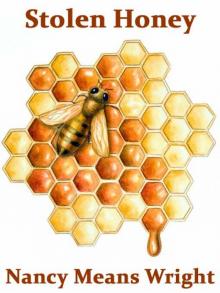 Stolen Honey
Stolen Honey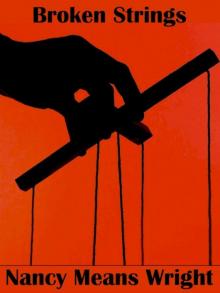 Broken Strings
Broken Strings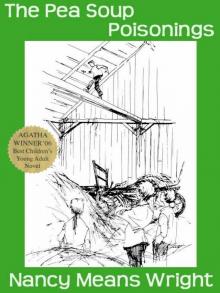 The Pea Soup Poisonings
The Pea Soup Poisonings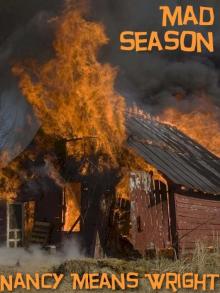 Mad Season
Mad Season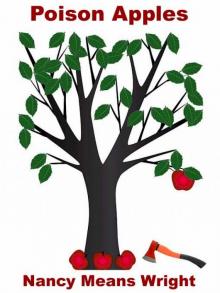 Poison Apples
Poison Apples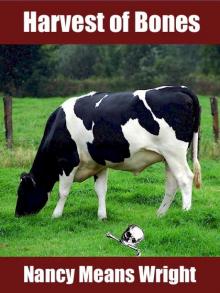 Harvest of Bones
Harvest of Bones